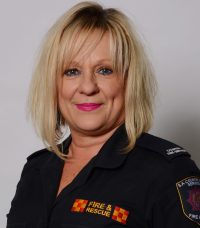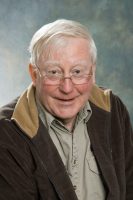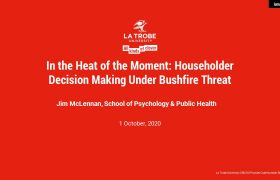2020 Webinar Recordings
In the lead-up to the EMPA 2020 Conference successful virtual event, EMPA took this opportunity to provide delegates with further digital access to expert presentations.
Click on the titles below to jump to the webinar information and recording:
Understanding fake news in emergencies – bots, trolls and the media cycle, Dr Tim Graham
Motivators, experiences & emotions: being an SES volunteer, A/Prof Patrick
UNDERSTANDING FAKE NEWS IN EMERGENCIES – BOTS, TROLLS AND THE MEDIA CYCLE
Social media bots and trolls have taken over from rumours as the next big challenge for emergency response communicators – but do we know enough to counter their destructive messaging?
Queensland University of Technology social media researcher, Tim Graham, is part of a research team that investigated the role of bots and trolls in the rise of #ArsonEmergency during the bushfires, and is now examining similar false narratives in COVID-19. Join the first EMPA webinar to discover how to detect the influence of bots and trolls on emergency dialogue, and the motivations of these types of Twitterati that will help you counter these false narratives.
PRESENTER: Dr Tim Graham, QUT
DATE: Thursday 14 May 2020

Dr Tim Graham
Senior Lecturer, Digital Media, Queensland University of Technology (QUT
He is a Chief Investigator of an ARC Discovery Project that utilises large-scale hyperlink network analysis and web experiments to comparatively assess the web presence of 10 countries. He develops open source software tools for big data analysis, and has published in journals such as Information, Communication & Society, Information Polity, Big Data & Society, and Critical Social Policy.
Motivators, experiences & emotions: being an SES volunteer
EMPA Australia 2020 Awards For Excellence in Emergency Communication – Research HIGHLY COMMENDED
This study, from the Bushfire and Natural Hazards CRC (see team names to right), covers research that is providing insights and data nationally to help develop new recruitment and retention strategies for State Emergency Services (SES) volunteers.
Findings show that volunteers deeply value their connection to their unit, derive meaning from both positive and negative emotional experiences, and sometimes have vague expectations about emergency services volunteering. Managing the expectations of volunteers is not a simple task; some volunteers have too few expectations, and others too many. Both of these scenarios can lead to volunteers having a negative experience and influence their turnover intentions.
PRESENTER: A/Prof Patrick Dunlop, Curtin University
DATE: Tuesday 4 August 2020
Study team
A/Prof Patrick Dunlop
Dr Djurre Holtrop
Prof Marylène Gagné
(Curtin University)
Dr Darja Kragt
Dr Aleksandra Luksyte
Hawa Muhammad Farid
(University of Western Australia)

Patrick Dunlop
Associate Professor
CFS Bushfire Ready Campaign 2020
EMPA Australia 2020 Awards For Excellence in Emergency Communication – Readiness and resilience WINNER
The Bushfire Ready Campaign strategically aligned to the SA CFS Corporate Plan objective Supporting Resilient Communities through Risk Reduction and specifically addressed the target: to achieve a 10% increase in the number of current households in high bushfire prone areas that have a self- assessed level of preparedness for a bushfire by 2020.
The SACFS Be Bushfire Ready campaign was planned over a number of months, with consultation with key stakeholders, rigid approval process, qualitative and quantitative research, evaluation and review of the previous years’ campaign and commissioning experienced creative agency and media agencies.
PRESENTER: Kathy Baklan, SA CFS, Media & Communications
DATE: Thursday 27 August 2020

Kathy Baklan
South Australian Country Fire Service
She now works for the South Australian Country Fire Service (SACFS) developing and implementing multimedia campaigns, internal and external communications, and media liaison. She is passionate about helping and working for the South Australian Community and her role in the SACFS helps her achieve this by educating the community in high risk bushfire zones on preparedness and resilience.
Kathy is passionate about her work and believes in developing good relationships with creative and media agencies to ensure the very best outcome in meeting organisational objectives. Her first project in the SA Government was to review the number plate pricing and range. She successfully introduced a new range of colours that the public were able to purchase and continues to be well received and continues to provide funds into the Transport Road budget revenue. I often tell people “when I go, at least a part of me will be left on the roads”.
Another passion of Kathy’s is her love of animals and has three border collies and was previously a registered breeder of border collies. Her motto for life is simple – “always, always… be honest, ethical and treat others how you would want to be treated.
How decision making is affected by stress & what it means for emergency communicators
During his 25 years in counselling psychology, Jim became increasingly interested in how people made decisions. This rekindled interest from early days in safety-related decision making.
PRESENTER: Prof Jim McLennan, La Trobe University
DATE: Thursday 1 October 2020
Session recording

Professor Jim McLennan
Click the image above to view a PDF of the presentation slides or view the video recording of the presentation and Q&A



